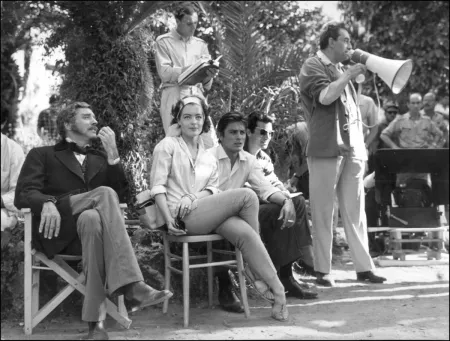\Palermo prepared for the latest invasion. The city was confident. After twenty-five centuries of Romans and Carthaginians, Normans and Arabs, Spaniards and Britons, surely it could handle a Hollywood film crew, even one lead by a Milanese duke. But at Punta Raisi, the welcoming committee faced a more formidable (if less colorful) force than Garibaldi’s Red Shirts. Armed with a five-million-dollar budget, Twentieth-Century Fox had assembled a battalion of two hundred carpenters, ten dozen make-up artists, hairdressers, and seamstresses; sixty cameramen, twenty electricians, fifteen florists, and ten cooks. “If the Allies had been this organized,” joked the pug-faced mayor, “Operation Husky would have been less a fiasco.”
The studio publicist, a propaganda officer during the war, laughed and pointed at the lanky figure on the tarmac. “The Maestro’s a better general.”
A dying breed, the mayor conceded. According to the studio press kits, which the publicist had distributed to the delegation, the director descended from cardinals and warlords, “whose massive red sarcophagi continue to awe visitors to the Duomo di Milano.” The Maestro, the publicist said, never lost his dignity and never compromised his standards. “Gavin,” he once explained, in his thickly accented English, “one must be in-tran-sigent.” The publicist, an Illinois farm boy who had flunked out of Purdue, had learned the meaning of the word when the Maestro risked his life on their last film. When a fire broke out on the set, he kept shooting until the ceiling collapsed. Recovering in the infirmary, the director—swathed in bandages like a B-movie mummy—endured the producer’s tirade. “Cretino! You have a death wish?” The duke merely smiled and pointed to his family crest: a blasted tower, copied from a fifteenth-century tarot deck, and the motto “Si fractus illabatur orbis, impavidum ferient ruinae.”
The anecdote annoyed the city council. Where they expected to applaud this maniac’s high-school Latin? The duke, fencing with the media, ignored the pursed lips. His crested hair gleaming with pomade, he seemed dressed for a duel. He wore a black silk shirt, white linen jacket, taupe slacks, and custom-made shoes. “No,” he said, “this story is not a paean to the past! At heart I’m a progressive, a humanist!”
The paparazzi hid their smirks. Like most aristocrats, the director voted left but lived right. Though an outspoken Communist, he had become a duke on his father’s death, inherited his mother’s cosmetics fortune, and owned five cars and a dozen houses. Liveried butlers at his Roman villa served pheasant on gold plate, while grooms stocked his four-hundred-year-old stables at Monza with stallions and gigolos. His Excellency rode both.
“But aren’t studio epics risky in an age of television?” asked one reporter, a novice whose acne had become enflamed by the airport’s heat and fumes. “The cost alone—”
The director’s hawk-like face radiated contempt. Never contradict a man who called Maria Callas . . . well, even the tabloids wouldn’t print it. “Cost is meaningless!” he hissed. “Truth alone has value! The quest for authenticity knows no budget.”
The mayor grunted. Geniuses can jaw about authenticity, but lesser mortals must deal with budgets. This film wasn’t going to be another white elephant, was it? Cleopatra, he had read, already had cost Fox forty-four million and remained unfinished. But the publicist poured oil on these troubled waters. Epics were very marketable, he assured the mayor. Consider the largest grossing films of the past five years: Ben-Hur, Spartacus, El Cid, Lawrence of Arabia. Now Sicily would profit from its own epic, a sweeping tale about its marvelous past.
The past wasn’t so marvelous, the mayor brooded. And Sicilians didn’t need epics! They needed window fans and refrigerators! The only reason he had agreed to this crazy scheme was to stimulate tourism.

